语法专题 专题七 虚拟语气
英语语法 虚拟语气的知识点归纳
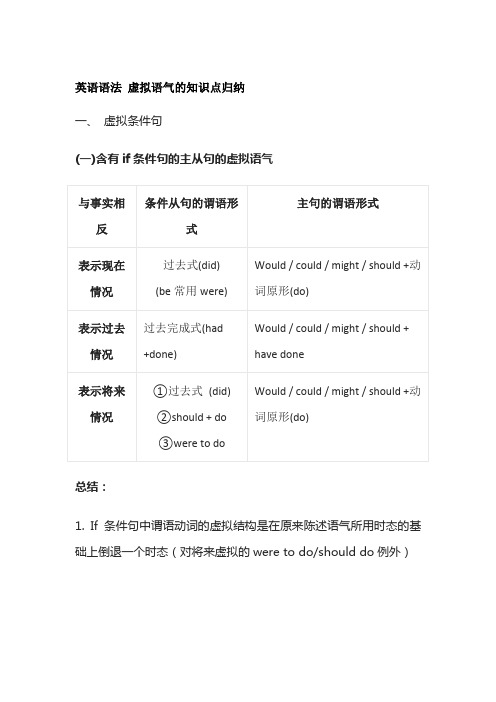
英语语法虚拟语气的知识点归纳一、虚拟条件句(一)含有if条件句的主从句的虚拟语气总结:1. If 条件句中谓语动词的虚拟结构是在原来陈述语气所用时态的基础上倒退一个时态(对将来虚拟的were to do/should do例外)2. 主句要借助于情态动词的过去式,后跟动词原形(现在或将来)或have done(过去);if条件句中只出现一个情态动词,即对将来虚拟的should.3.做此类题目时一定要分清是从句还是主句谓语动词的虚拟,还要把握好时态。
注意:1. 在虚拟条件从句中,动词“be”的过去时态一律用”were”,不用was。
2. 在虚拟条件状语中如果有were, should, had这三个词中任何一个,可省略if,把这三个词提到主语之前, 变成:were/should/had +主语+剩余成分。
3.在虚拟条件状语从句中,省略连词的倒装形式的句首不能用动词的缩略形式。
如我们可说Were I not to do., 而不能说Weren‘t I to do。
4.在表示与将来事实相反的条件句中,只能用should,而不能用would,could和might 等。
5.主句中的should通常用于第一人称,would,could以及might 可以用于各种人称eg :①If I were a bird, I could fly in the air.如果我是一只小鸟,我就能在空中飞行。
②I wish I could pass the examination.我希望我能通过考试。
在虚拟条件句中,对于与将来事实相反的情形,请注意以下几点:(1)条件从句表示的内容与将来事实相反,实为对将来情况的推测,用过去时表示虚拟;(2)条件从句谓语除用过去式外,有时也用“should+动词原形(表示可能性极小,常译为“万一”)”或“were to+动词原形(表示与将来事实相反的假设)”;(3)条件从句使用“should+动词原形”这样的谓语形式时,主句谓语除可用“should (would, could, might)+动词原形”这样的虚拟语气形式外,也可用直陈语气或祈使语气。
(完整版)英语虚拟语气语法归纳总结
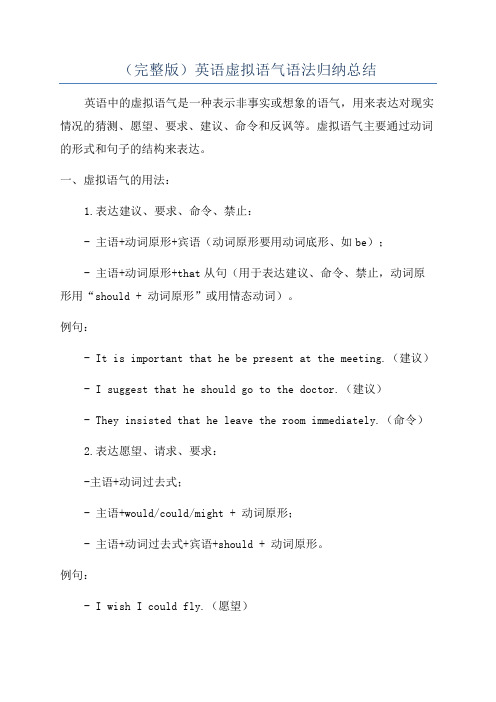
(完整版)英语虚拟语气语法归纳总结英语中的虚拟语气是一种表示非事实或想象的语气,用来表达对现实情况的猜测、愿望、要求、建议、命令和反讽等。
虚拟语气主要通过动词的形式和句子的结构来表达。
一、虚拟语气的用法:1.表达建议、要求、命令、禁止:- 主语+动词原形+宾语(动词原形要用动词底形、如be);- 主语+动词原形+that从句(用于表达建议、命令、禁止,动词原形用“should + 动词原形”或用情态动词)。
例句:- It is important that he be present at the meeting.(建议)- I suggest that he should go to the doctor.(建议)- They insisted that he leave the room immediately.(命令)2.表达愿望、请求、要求:-主语+动词过去式;- 主语+would/could/might + 动词原形;- 主语+动词过去式+宾语+should + 动词原形。
例句:- I wish I could fly.(愿望)- I would appreciate it if you could help me.(请求)3.表示虚拟条件:- If条件从句中的谓语动词用过去完成时,主句用would/should/might/could + have + 过去分词;- If条件从句中的谓语动词用过去时,主句用would/should/could + 动词原形。
例句:- If I had known his phone number, I would have called him.(虚拟条件)- If you had listened to me, we could have finished the project earlier.(虚拟条件)4.表达建议、要求、祝愿:- If only内部称述 + 主语 + 过去式。
高中英语2025届高考语法复习虚拟语气知识讲解

高考英语语法复习虚拟语气知识讲解一、基础知识(一)什么是虚拟语气谓语动词的作用不仅可以表示动作的时间、状态、假设(情感),也是一种语气(mood)的表现形式,表明说话的目的和意图。
(语气包含陈述语气、祈使语气、虚拟语气、疑问语气)虚拟语气用于表示假设、愿望、建议、命令等非真实或虚拟的情况,即与真实相反。
上学的时候老师经常举的一个例子,"If I were you"因为我不可能是你,这是一种不可能存在的事实,所以这是个虚拟语句。
总而言之英语中的虚拟语气可以分为两大体系:一是表示与事实相反的,或者是假象的情形,通常由if引导,叫做虚拟条件句;另一个体系是在名词从句中使用虚拟语气,表示建议,命令或者要求等语气,类似于上述美剧常用的台词。
(二)虚拟语气的用法这一部分我们主要用虚拟语气在条件句中的用法作为讲解与现在事实相反:If I had a map, I would lend it to you.如果我有地图我就借给你。
(但我没有)与将来事实相反:If I were to do the job, I would do it in a different way. 要是我来做这工作,我会是另一种做法。
(言外之意不是我做这个工作,用虚拟表达是我做这份工作的可能性很低)与过去事实相反:If anything had happened, he would have let us know.如果发生了什么情况,他早就通知我们了。
(所以没事发生)它们的共性都是表示与事实相反或者实现可能性不大3.特殊情况①在极少情况下,从句的谓语动词用原形,主句的谓语动词可用陈述语气(比较官方,正式,大气的说法,口语很少使用)If that be the official view, it cannot be accepted.如果这是官方的看法,这是不能接受的。
②if可以省略,但是语序要改为倒装Were I Tom I would refuse.如果我是汤姆我会拒绝。
高中英语之虚拟语气详细讲解
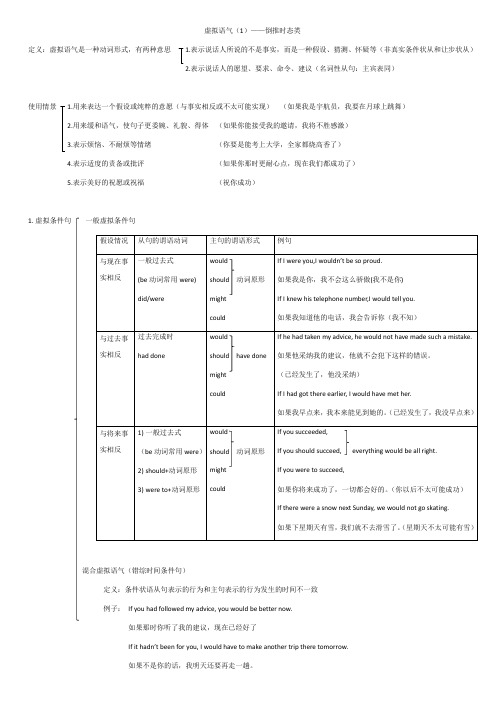
虚拟语气(1)——倒推时态类定义:虚拟语气是一种动词形式,有两种意思 1.表示说话人所说的不是事实,而是一种假设、猜测、怀疑等(非真实条件状从和让步状从)2.表示说话人的愿望、要求、命令、建议(名词性从句:主宾表同)使用情景 1.用来表达一个假设或纯粹的意愿(与事实相反或不太可能实现)(如果我是宇航员,我要在月球上跳舞)2.用来缓和语气,使句子更委婉、礼貌、得体(如果你能接受我的邀请,我将不胜感激)3.表示烦恼、不耐烦等情绪(你要是能考上大学,全家都烧高香了)4.表示适度的责备或批评(如果你那时更耐心点,现在我们都成功了)5.表示美好的祝愿或祝福(祝你成功)1.虚拟条件句一般虚拟条件句混合虚拟语气(错综时间条件句)定义:条件状语从句表示的行为和主句表示的行为发生的时间不一致例子:If you had followed my advice, you would be better now.如果那时你听了我的建议,现在已经好了If it hadn’t been for you, I would have to make another trip there tomorrow.如果不是你的话,我明天还要再走一趟。
If you had studied hard before,you would be a college student now.如果你以前努力学习的话,你现在就是大学生了。
省略+倒装当虚拟条件句的谓语动词中含有were,should,had时,if可以省略,并将were,should,had提前于句首,变为倒装句。
如果虚拟条件句是否定句,not 保留在原处If he should agree to go there, we should send him there.= Should he agree to go there,we should send him there.If she were there,she would agree with us.= Were she were, she would agree with us.If he had learnt about computers,we would have hired him.= Had he learnt about computers,we would have hired him.含蓄虚拟条件句定义:有时为了表达的需要,在虚拟语气中并不总是出现if引导的条件状语从句,而是通过其他手段来代替条件从句分类:1) but for....=(If it+be not for) ;without;Without your help ,we couldn’t have finished the work ahead of time.= But for your help,we couldn’t have finished the work ahead of time.= If it hadn’t been for your help,we couldn’t have finished the work ahead of time.没有你的帮助,我们不可能完成任务。
【志鸿优化设计】2014届高考英语第一轮复习 (归纳拓展+巩固提升)语法专题七 虚拟语气(含解析) 译林牛津
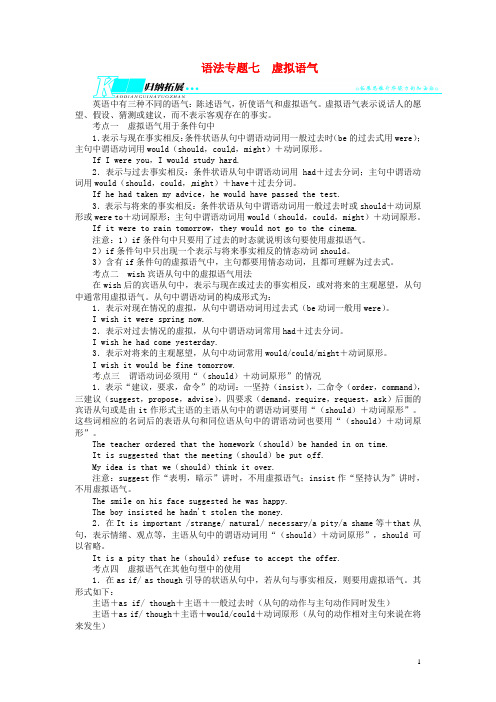
语法专题七虚拟语气英语中有三种不同的语气:陈述语气,祈使语气和虚拟语气。
虚拟语气表示说话人的愿望、假设、猜测或建议,而不表示客观存在的事实。
考点一虚拟语气用于条件句中1.表示与现在事实相反:条件状语从句中谓语动词用一般过去时(be的过去式用were);主句中谓语动词用would(should,could,might)+动词原形。
If I were you,I would study hard.2.表示与过去事实相反:条件状语从句中谓语动词用had+过去分词;主句中谓语动词用would(should,could,might)+have+过去分词。
If he had taken my advice,he would have passed the test.3.表示与将来的事实相反:条件状语从句中谓语动词用一般过去时或should+动词原形或were to+动词原形;主句中谓语动词用would(should,could,might)+动词原形。
If it were to rain tomorrow,they would not go to the cinema.注意:1)if条件句中只要用了过去的时态就说明该句要使用虚拟语气。
2)if条件句中只出现一个表示与将来事实相反的情态动词should。
3)含有if条件句的虚拟语气中,主句都要用情态动词,且都可理解为过去式。
考点二wish宾语从句中的虚拟语气用法在wish后的宾语从句中,表示与现在或过去的事实相反,或对将来的主观愿望,从句中通常用虚拟语气。
从句中谓语动词的构成形式为:1.表示对现在情况的虚拟,从句中谓语动词用过去式(be动词一般用were)。
I wish it were spring now.2.表示对过去情况的虚拟,从句中谓语动词常用had+过去分词。
I wish he had come yesterday.3.表示对将来的主观愿望,从句中动词常用would/could/might+动词原形。
英语语法——虚拟语气
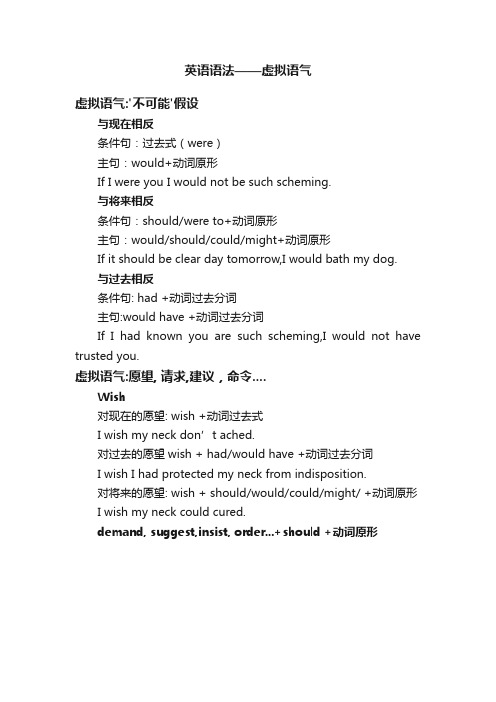
英语语法——虚拟语气
虚拟语气:'不可能'假设
与现在相反
条件句:过去式(were)
主句:would+动词原形
If I were you I would not be such scheming.
与将来相反
条件句:should/were to+动词原形
主句:would/should/could/might+动词原形
If it should be clear day tomorrow,I would bath my dog.
与过去相反
条件句: had +动词过去分词
主句:would have +动词过去分词
If I had known you are such scheming,I would not have trusted you.
虚拟语气:愿望, 请求,建议,命令....
Wish
对现在的愿望: wish +动词过去式
I wish my neck don’t ached.
对过去的愿望wish + had/would have +动词过去分词
I wish I had protected my neck from indisposition.
对将来的愿望: wish + should/would/could/might/ +动词原形
I wish my neck could cured.
demand, suggest,insist, order...+should +动词原形。
高考英语语法:虚拟语气讲义

虚拟语气虚拟语气表示动作或状态与事实相反,或不可能发生的情况。
一、虚拟语气用于条件状语从句中从句主句与现实事实相反一般过去式(be--were)Should/would/could/might + V原与过去事实相反Had + done Should/would/could/might +have done与将来事实相反过去式;should+V 原;were to + V原Should/would/could/might + V原1. 表示与现在事实相反或不可能发生:条件状语从句:一般过去时(虚拟语气中be→were)主句用:would(should, could, might)+动词原形。
If we had time now, we would read it again.If I were you, I would work hard.2. 表示与过去事实相反或不可能发生:条件状语从句:had+过去分词;主句:would(should, could, might)+have+过去分词。
If he had taken my advice, he would have succeeded in the test.If I had known your telephone number then, I would have called you.3. 表示与将来的事实可能相反或不可能发生:条件状语从句:①一般过去时②should +动词原形③were to+动词原形;主句:would(should, could, might)+动词原形。
If it should rain, the crops would be saved.If it were to snow tomorrow, they would not go out.例句:If there were no subjunctive mood, English ( ) much easier to learn. (B)A. could have beenB. would beC. will beD. would have been(2)省略if的虚拟语气如果从句中含有were/ should/ had时,则可以把这三个词置于句首,省略if.采用倒装语序。
虚拟语气知识点总结
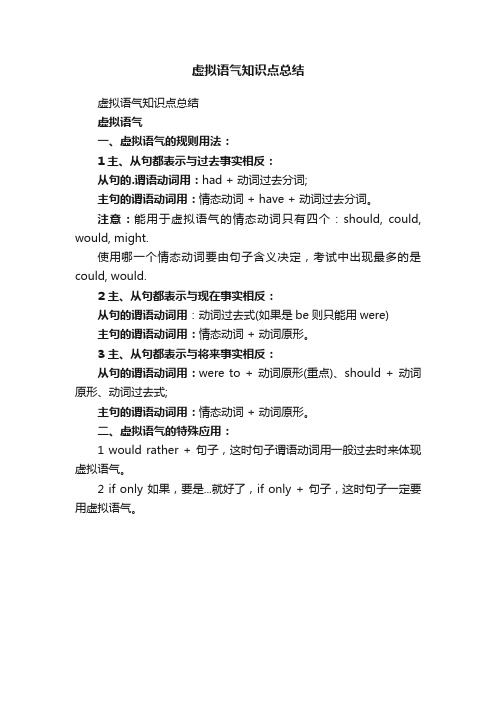
虚拟语气知识点总结
虚拟语气知识点总结
虚拟语气
一、虚拟语气的规则用法:
1主、从句都表示与过去事实相反:
从句的.谓语动词用:had + 动词过去分词;
主句的谓语动词用:情态动词 + have + 动词过去分词。
注意:能用于虚拟语气的情态动词只有四个:should, could, would, might.
使用哪一个情态动词要由句子含义决定,考试中出现最多的是could, would.
2 主、从句都表示与现在事实相反:
从句的谓语动词用:动词过去式(如果是be则只能用were)
主句的谓语动词用:情态动词 + 动词原形。
3 主、从句都表示与将来事实相反:
从句的谓语动词用:were to + 动词原形(重点)、should + 动词原形、动词过去式;
主句的谓语动词用:情态动词 + 动词原形。
二、虚拟语气的特殊应用:
1 would rather + 句子,这时句子谓语动词用一般过去时来体现虚拟语气。
2 if only 如果,要是...就好了,if only + 句子,这时句子一定要用虚拟语气。
英语语法—虚拟语气(最全)
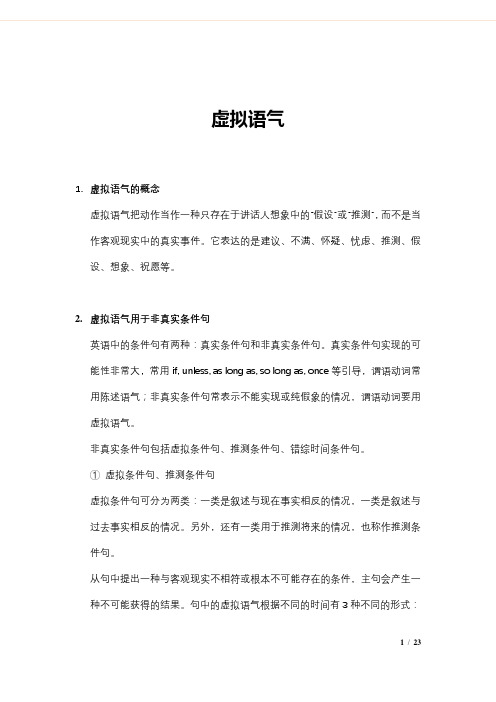
虚拟语气1.虚拟语气的概念虚拟语气把动作当作一种只存在于讲话人想象中的“假设”或“推测”,而不是当作客观现实中的真实事件。
它表达的是建议、不满、怀疑、忧虑、推测、假设、想象、祝愿等。
2.虚拟语气用于非真实条件句英语中的条件句有两种:真实条件句和非真实条件句。
真实条件句实现的可能性非常大,常用if, unless, as long as, so long as, once等引导,谓语动词常用陈述语气;非真实条件句常表示不能实现或纯假象的情况,谓语动词要用虚拟语气。
非真实条件句包括虚拟条件句、推测条件句、错综时间条件句。
①虚拟条件句、推测条件句虚拟条件句可分为两类:一类是叙述与现在事实相反的情况,一类是叙述与过去事实相反的情况。
另外,还有一类用于推测将来的情况,也称作推测条件句。
从句中提出一种与客观现实不相符或根本不可能存在的条件,主句会产生一种不可能获得的结果。
句中的虚拟语气根据不同的时间有3种不同的形式:I would lend him the money if he asked me.他要是问我,我愿意借钱给他。
(意愿)If he had time, he should do it.要是有时间,他愿意做那件事。
(意愿)He could move the big stone if he should try.努力的话,他能搬动那块大石头。
(能力)If he forgot to come, you could go instead.他要是忘了没来,你可要替他来。
(许诺)A.与现在事实相反If I had enough money, I would buy a computer.如果我有足够的钱,我将买一台电脑。
(实际上没有) Were I you I would refuse.如果我是你我会拒绝。
(我不是你)注:从句有时可用If it were not for这种句型,表示“若不是……”。
It it weren’t for your help, we would be in serious trouble.若不是你帮忙,我们会遇到大麻烦。
高中英语语法-虚拟语气全总结

高中英语语法-虚拟语气全总结虚拟语气用于表示与现实相反的假设。
在非真实条件句中,如果从句表示与现在事实相反的假设,主句应该使用XXX动词原形。
例如,如果我有时间,我会参加会议。
如果你是我,你会抓住出国的机会。
如果从句表示与过去事实相反的假设,主句应该使用主语+XXX过去分词。
例如,如果你听从了我的建议,你就不会在考试中失败了。
如果从句表示与将来事实相反的假设,主句应该使用主语+XXX动词原形。
例如,如果你明天来,我们就会开会。
如果明天下雨,我们就会推迟运动会。
如果他明天不来,我们就会推迟会议到下周一。
有时候,条件状语从句和主句所表示的时间不一致,这时候被称为错综时间条件句。
动词的形式要根据它所表示的时间作出相应的调整。
例如,如果你刚才听从了我的建议,你现在会更好。
如果你之前努力研究,你现在就是一名大学生了。
在条件句中,可以省略if,把were、had、should提到句首,变成倒装句式。
例如,如果我还有上学的机会,我会更加努力研究。
→Were I at school again。
I would study harder.Had you arrived earlier。
you would have caught the bus.If it rains tomorrow。
we won't be able to go climbing.What would you do if you had a n dollars?Without your help。
we XXX the work ahead of time.I was ill that day。
otherwise I XXX.He called me to inform me about your birthday。
or else I wouldn't have known about it.A man who s drinking water would be dead in about seven days.I might have been able to offer you more assistance。
虚拟语气讲解(整理)

(3)虚拟语气在 在主语从句中
A.在句型 “It is important (necessary, strange, natural) that .... ” 中,that 后面的从句中的谓语动词 用: should + 动词原形
1. 我们有必要出去散散步。 It’s necessary that we should have a walk now.
2.用于表示命令、建议、要求等一类词后面的宾语从句。 insist, order, command, suggest, advise, propose, require, request, demand, desire etc.
We suggested that the meeting (should) be put off.
7. It is of the utmost importance that you ______ here on time. a. be b. shall be c. are to be d. must be
三、虚拟语气在其他从句中
1. It is (high / about ) time that…从句中的谓 语动词用过去式或should+动词原形,should 不能省略. It is high time that you went / should go to school.
I would rather you told me the truth. I would rather you had gone there last Sunday.
4. as if ( as though) 看起来 常用虚拟形式,即 表示与现在事实相反,用过去式;与过去事实相反 用过去完成式 (had done).
初中英语语法知识总结之虚拟语气

初中英语语法知识总结之虚拟语气虚拟语气是英语中的一种特殊语气,用于表示与事实相反的假设、愿望、建议、命令等。
在初中英语中,虚拟语气是一个重要的语法知识点,掌握好虚拟语气的用法可以帮助我们更准确地表达自己的意思。
下面是对初中英语虚拟语气的相关知识总结。
一、虚拟语气的用法1.与现在事实相反的虚拟语气(与现在事实相反的假设)表示对现在情况的否定、假设或建议。
a) 与现在动作情况相反:If I were you, I would study harder.(如果我是你,我会更加努力学习。
)注意:“were”在这里被用作“was”的虚拟形式,表示与现在事实相反的假设。
b) 与现在实际情况相反:I wish I had more time.(我希望我有更多时间。
)注意:“I wish”后跟的是“had”,表示现在我没有更多时间的愿望。
2.与过去事实相反的虚拟语气(与过去事实相反的假设)表示对过去情况的否定、假设或建议。
a) 与过去动作情况相反:If I had studied harder, I would have passed the exam.(如果我当初学得更努力,我就能通过这次考试了。
)b) 与过去实际情况相反:I wish I had listened to my parents.(我希望我当初听了我的父母的话。
)3.与将来事实相反的虚拟语气(与将来事实相反的假设)表示对将来情况的否定、假设或建议。
a) 表示对将来情况的不可能性:If it were to rain tomorrow, we would cancel the picnic. (如果明天下雨,我们就会取消野餐计划。
)b) 表示对将来情况的愿望:I hope I will pass the exam. (我希望我能通过考试。
)二、虚拟语气的常见句型1. If only + 过去式表示很遗憾没有实现过去的愿望。
例如:If only I had listened to my teacher's advice, I would not have made such a mistake.(要是我当初听从了老师的建议,就不会犯这样的错误了。
2019版高考英语专题化语法讲义专题七情态动词与虚拟语气

专题七 情态动词与虚拟语气情态动词的基本用法情态动词具有一定的词义,没有人称和数的变化,必须和其他动词一起构成谓语,用 来表示愿望、态度或推测等。
You may use my dictionary.你可以使用我的字典。
(表示“允许”)You can ' t have seen him just now. He has been abroad for nearly a month.你刚才不可能看见他了,他已经出国近一个月了。
(表示“推测”)1.表示能力(2)表示将来的能力:will be able to (3)表示过去的能力could 表示过去的能力,不表示是否做was/were able to 表示过去有能力做并且成功地做了,相当于: managed to do sthJsucceeded in doing sth.could have done 表示过去本来能够做但未做 I can ' t promise anything, but I ' ll do what I can .我不能许诺什么,但我会尽力而为。
(表示现在的能力)If you have a good sleep, you will be able to work out this problem.如果你好好睡一觉,你将能够解出这道题。
(表示将来的能力)The fire spread through the hotel very quickly but everyone was able to get out.尽管这场大火迅速蔓延到了这个宾馆,但是每个人都逃了出去。
(表示过去有能力做并 且成功地做了)I could have worked out the problem, but I was too nervous.我本来可以解出这道题,但我太紧张了。
(表示本来有能力做但未做)2.表示推测(可能性)可能性可分为客观的可能性和具体事情实际发生的可能性两种。
虚拟语气详细讲解及经典习题 附答案
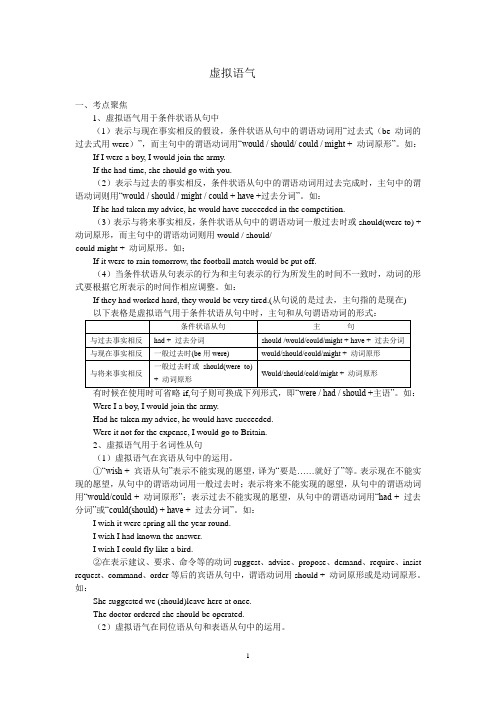
虚拟语气一、考点聚焦1、虚拟语气用于条件状语从句中(1)表示与现在事实相反的假设,条件状语从句中的谓语动词用“过去式(be动词的过去式用were)”,而主句中的谓语动词用“would / should/ could / might + 动词原形”。
如:If I were a boy, I would join the army.If the had time, she should go with you.(2)表示与过去的事实相反,条件状语从句中的谓语动词用过去完成时,主句中的谓语动词则用“would / should / might / could + have +过去分词”。
如:If he had taken my advice, he would have succeeded in the competition.(3)表示与将来事实相反,条件状语从句中的谓语动词一般过去时或should(were to) + 动词原形,而主句中的谓语动词则用would / should/could might + 动词原形。
如;If it were to rain tomorrow, the football match would be put off.(4)当条件状语从句表示的行为和主句表示的行为所发生的时间不一致时,动词的形式要根据它所表示的时间作相应调整。
如:If they had worked hard, they would be very tired.(从句说的是过去,主句指的是现在)Were I a boy, I would join the army.Had he taken my advice, he would have succeeded.Were it not for the expense, I would go to Britain.2、虚拟语气用于名词性从句(1)虚拟语气在宾语从句中的运用。
专题七 情态动词和虚拟语气
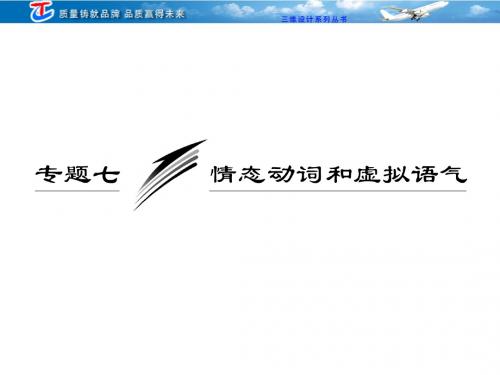
其实我本没必要买这么多酒,只来了三个人。
2.表示后悔、责备或遗憾 (1)could have done表示过去没有实现的可能性,意为“本 来可以„„”。
(2)might have done表示“本来应该或可以做某事”之意,
含有轻微的责备语气。 (3)should/ought to have done用于肯定句时,表示本该做某 事,而实际上未做;用于否定句时,则表示不该做的事 反而做了。
句或否定句中。
You must have gone to bed late last night.You look tired.
昨天晚上你一定睡得很晚,你看起来很疲倦。
He cannot have forgotten it.他不可能忘记它了。 It's too late.I think he may have gone to bed. 天太晚了,我想他或许已睡觉了。
[情态动词]
一、表能力 can be able to will be able to could was/were able to could have +p.p. 表示现在的能力 表示将来的能力 表示过去的能力 表示过去有能力做但未做
I am starving to death. I can eat two bowls of rice now. (现在的 能力)我快饿死了。我现在能吃两碗米饭。 If you have a good sleep, you will be able to work out this problem.(将来的能力)如果你睡得好,你就能解决这个问题。 I could have caught that bus, but I didn't. (过去有能力做但未做)我本可以追上那辆公交车的,但却没有。
英语的虚拟语气知识点讲解

英语的虚拟语气知识点讲解一、虚拟语气的概念。
虚拟语气是一种特殊的动词形式,表示所说的话不是事实,而是一种假设、愿望、怀疑、推测或与事实相反的情况等。
二、虚拟语气在非真实条件句中的用法。
1. 与现在事实相反。
- 条件从句的谓语动词用一般过去式(be动词一般用were),主句的谓语动词用“should/would/could/might + 动词原形”。
- 例如:If I were you, I would take an umbrella.(实际上我不是你)2. 与过去事实相反。
- 条件从句的谓语动词用“had + 过去分词”,主句的谓语动词用“should/would/could/might+have +过去分词”。
- 例如:If he had taken my advice, he would have passed the exam.(实际上他没听我的建议,也没通过考试)3. 与将来事实相反。
- 条件从句的谓语动词有三种形式:一般过去式、“should+动词原形”、“were to+动词原形”,主句的谓语动词用“should/would/could/might +动词原形”。
- 例如:If it rained/were to rain/should rain tomorrow, we would not go out.三、虚拟语气在宾语从句中的用法。
1. wish后的宾语从句。
- 表示与现在事实相反的愿望,从句谓语动词用一般过去式(be动词用were)。
例如:I wish I were a bird.(实际上我不是鸟)- 表示与过去事实相反的愿望,从句谓语动词用“had+过去分词”。
例如:Iwish I had seen the film yesterday.(实际上昨天没看这部电影)- 表示与将来事实相反的愿望,从句谓语动词用“would/could/might+动词原形”。
例如:I wish I could fly to the moon tomorrow.2. 在表示建议、要求、命令等意义的动词后的宾语从句中(如suggest, advise, demand, require, order等)- 从句谓语动词用“should+动词原形”,should可以省略。
专题七 情态动词和虚拟语气

情态动词和虚拟语气1.—Where is Lucy?—I can't say where she is,but she________ have gone to meet her classmates,for they want to go to Sichuan to work as volunteers.A.can B.shouldC.must D.may解析:这里表示对过去状况的推断,用“情态动词+have done”。
从前面的“我不确定她在哪里”可知,用may have done,表示“过去可能已经做了……”(不确定)。
must have done 表示“过去一定做了……”(非常确定);can have done 用在否定句和疑问句中,should have done 表示“过去本该做……(实际却没做)”。
答案:D2.If you had brought your swimsuit with you, we ________ swimming in the lake now.A.could go B.could have goneC.can go D.have gone解析:考查虚拟语气。
句意:如果你此前带着游泳衣的话,现在我们就可以在湖中游泳了。
本句是混合虚拟条件句,前半句是对过去情况的假设,后半句是对现在事实的假设。
故选A项。
答案:A3.—Has Tim started?He said he would join in the party.—He________ .He is a man of his word.A.could have left B.must have leftC.can't come D.won't be coming解析:根据He is a man of his word.可知他是一个守信的人,因此推测他肯定已经启程了。
句意为:——Tim 启程了吗?他说他要参加聚会。
高中英语语法七[1].虚拟语气、情态动词
![高中英语语法七[1].虚拟语气、情态动词](https://img.taocdn.com/s3/m/bc23378a960590c69ec37643.png)
一、用“情态动词+have +done”结构表示 对过去动作的推测,高考试题中常用过去时 态或过去的时间状语给以暗示。情态动词的 这一用法可以用 “对立统一”来概括。
1.当试题的前句和后句在动作和意义上相互 补充说明,且整个句意在动作和时间上是一 个整体时,我们可用“统一”关系来解决这 样的试题。常见的结构有:
由题意和下句中的 “I’m not sure” 可知这段对话中存在一种 可能性推测,might可以用来表 示一种比较委婉的可能性判断, 故本题选D。
5)I should have been there, but I ____ _ not find the time. (上海2000春) A. would B. could C. might D. should
C. shouldn’t; must D. can’t; shouldn’t
mustn’t 表示“不可以;禁止”, 分析题意可知第二个空表示某种 可能性,故本题选B。
7) —Will you stay for lunch﹖ —Sorry, ______. My brother is coming to see me. (NMET’99) A. I mustn’t B. I can’t C. I needn’t D. I won’t
2) —I hear you’ve got a set of valuable Australian coins. ______ I have a look﹖ —Yes, certainly. (北京2005春) A. Do B. May C. Shall D. Should
分析语境可知这是在征求对方的许 可,may表示“允许、可以”,语
C. could have studied D. studied
初中英语虚拟语气总结

初中英语虚拟语气总结在初中英语的学习中,虚拟语气是一个比较复杂但又十分重要的语法点。
它用来表达与事实相反的假设、愿望、建议等情况,让我们的语言更加丰富和准确。
接下来,让我们一起深入了解一下初中英语中的虚拟语气。
一、虚拟语气的定义和用途虚拟语气是一种特殊的动词形式,表示说话人所说的话不是事实,或者是一种假设、愿望、建议等。
它常常用于表达不太可能实现或与现实相反的情况。
例如:“If I were you, I would study harder”(如果我是你,我会更努力学习。
)在这个句子中,“我是你”是一种不可能的假设,所以使用了虚拟语气。
虚拟语气在英语中的用途非常广泛,主要包括以下几个方面:1、表达假设和条件如果某种情况与现实不同,我们就可以用虚拟语气来描述。
比如:“If it rained tomorrow, we would stay at home”(如果明天下雨,我们就待在家里。
)2、表达愿望和梦想当我们表达自己希望发生但实际上不太可能发生的事情时,会用到虚拟语气。
例如:“I wish I could fly like a bird”(我希望我能像鸟一样飞。
)3、提出建议和要求有时为了使建议听起来更加委婉和礼貌,我们会使用虚拟语气。
比如:“It's high time that you went to bed”(你该上床睡觉了。
)二、虚拟语气的基本形式1、与现在事实相反从句:If +主语+动词过去式(be 动词用 were)主句:主语+ would/could/should/might +动词原形例如:If I had enough money, I would buy a big house (如果我有足够的钱,我会买一座大房子。
)2、与过去事实相反从句:If +主语+ had +过去分词主句:主语+ would/could/should/might + have +过去分词例如:If I had studied hard, I would have passed the exam (如果我学习努力,我就会通过考试了。
- 1、下载文档前请自行甄别文档内容的完整性,平台不提供额外的编辑、内容补充、找答案等附加服务。
- 2、"仅部分预览"的文档,不可在线预览部分如存在完整性等问题,可反馈申请退款(可完整预览的文档不适用该条件!)。
- 3、如文档侵犯您的权益,请联系客服反馈,我们会尽快为您处理(人工客服工作时间:9:00-18:30)。
—No,you mustn’t.(No,you’d better not.)
(2)表示可能性时,might比may的可能性小,may表示的可能性
比can小(主要用于陈述句、肯定或否定句,疑问句用can代替)。
The story may not be true.
(3)表示祝愿(不用might)
May you succeed!
1
情态动词的考查要点
1.can,be able to 和could
(1)can和be able to都表示能力,意思上没多大区别。但can
只有现在和过去时,而be able to则有更多的形式。但当成
功地完成某一具体动作时,通常不用could而用was/were
able to来表示。这时was/were able to 相当于managed to,
(1)must表示“必须,应该,一定要”。强调主观看法,只
有现在时形式,否定式是must not(mustn’t)。must开头的
问句,其否定回答要用needn’t或don’t have to代替。
(2)must表示必然的结果。
All men must die.
(3)must还可表示主语固执、偏要做他人不希望做的事。 It can’t help;he must do that.
safely.
2.It can’t be the postman at the door. It’s only six o’clock.
3.—How’s your new babysitter?
—We
could
not ask for a better one. All our kids love her
—Can the news be true?
—It can’t be true.
Someone is knocking at the door.Who could it be?
(3)can可以表示理论上的可能性,指常有的行为或情形,意
为“有时会……”。
Anybody can make mistakes.
I can but wait.
I can’t but wait.
You can’t be too patient to the customers.
题组训练1
用can,could,be able to的适当形式填空 1.Though the building was on fire,they were able to go out
表示经过一番努力,终于能够完成某事。 Her mother can speak French.
The wounded man was still able to get to the village and was
saved by the villagers in the end.
(2)表示猜测“可能”,一般用于疑问句和否定句。
so much.
4.The police still haven’t found the lost child,but they’re
doing all they can . 5.You can’t be too careful when driving.
2.may和might的用法 (1)表示允许、请求,might比may的语言更委婉一些。 —May I watch TV now? —Yes,you may.(Yes,please.)
(4)may/might as well最好还是……,不妨
You might as well do it now. (5)may/might well很可能
He may well be late for class.
题组训练2 用may,might的适当形式填空
1.—I don’t really like James. Why did you invite him? —Don’t worry. He might/may not come. He said he wasn’t certain what his plans were.
3.As a student,you might/may as well make good use
of your time.
4.You 5. May
may
go to school either by bike or by bus.
she rest in peace.
3.must,have to和ought to的用法
句或感叹句中)。
How can that be true?I can’t believe my eyes and ears.
How could you be so careless?
(6)can的特殊用法。 can but只有;can’t but不得不;can’t...too再怎样也 不为过,越……越好
(4)表示请求、允许(表请求时,口语中常用could代替can使语
气更委婉,回答时用can)。
Can I go now?
—Could I come to see you tomorrow?
—Yes,you can.(否定答语可用No,I’m afraid not.)
(5)表示惊异、怀疑、不相信的态度(主要用于否定句、疑问
2.—I left my handbag on the train,but luckily someone
gave it to a railway official. might —How unbelievable to get it back! I mean,someone _____ have stolen it.
(4)have to着重客观需要,能用于更多时态(过去时或将来时)。
He will have to be there before ten.
(5)ought to表示义务和责任,“应该”,比should语气要强。 You ought to takeed和dare的用法 (1)need表示“需要,必要”,只能用于否定句和疑问句。 在肯定句中,常用must和have to代替。
